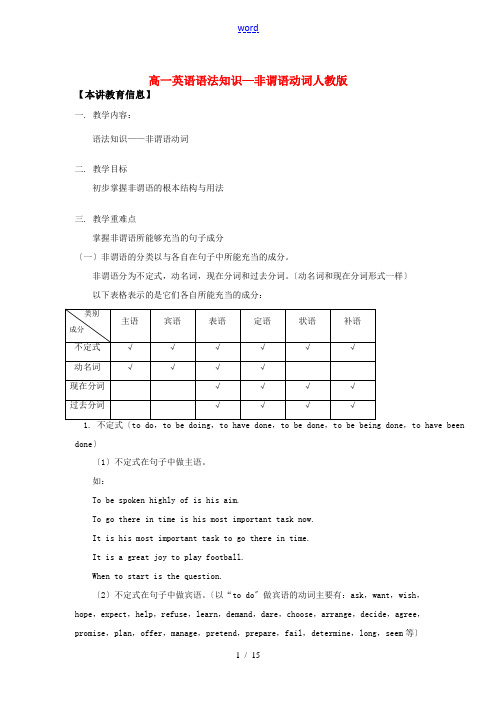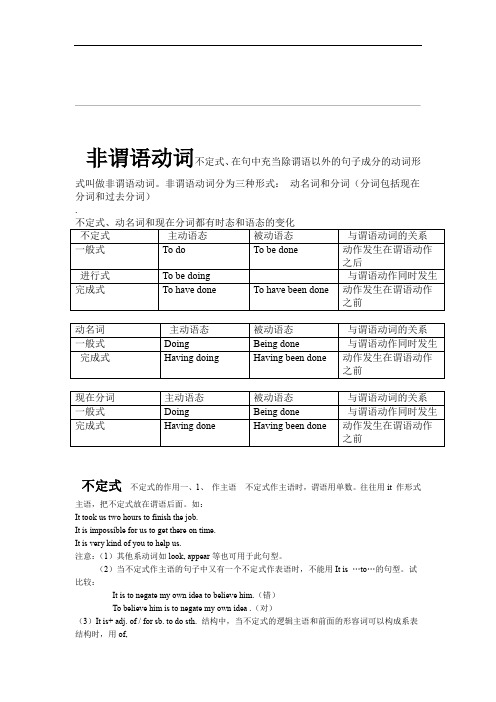高一英语讲义-非谓语动词讲义
高一英语非谓语动词精讲

高一英语非谓语动词精讲动名词1.主语 Swimming is dangerous for us.(泛指)区别:To swim in this river is dangerous for us.(具体指)It is no use / not any use /not any good /a waster of time /useless doing。
2.表语 Her job is teaching.3.定语 a working table ;a hiding place4.宾语只能接-ing形式的动词:advise,avoid,allow,consider,delay,dislike,enjoy,escape,finish,forbid,imagine,keep,mind,miss,practise,permit,risk,suggest区别:(1)forget /remember;go on;mean;regret;stop; try ;can’t help + doing /to do (2)need /want /require +doing / to be done(3)注意与to搭配的词组:devote to /look forward to /stick to /be used to /get down to /pay attention to(4)have a good /hard /wonderful time (in)doing/have trouble/difficulty in doing sth.(5)There is no good /use /need doing不区别:start, begin ,continue ,intend等后)+doing /to do但以下三种情况只用跟to do (1)Ice began to melt.(2)It is beginning to rain.(3)I began to understand (realize/believe/know) him.5.动名词的复合结构: 动名词可以有逻辑主语,通常是形容词物主代词(my,his,there)或名词所有格(Mary’s,Li Ming’s)。
高中非谓语动词课件

由此可见,连词在决定句子结构以及谓语动词和非谓语 动词的使用中起着关键的作用。
非谓语动词使用条件
一个句子当中,已经存在一个主句(谓语动词),又没有 连词的情况下, 还有别的动词出现时。
opened (open) the door 1. The man took out the key, _________ and entered the room. reading (read) a book. 2. The man sat there, _________ Work (work) hard, and you will succeed. 3. _______ discussed (discuss) at the meeting 4. The question ___________ yesterday is of great importance. To improve 5. ___________(improve) his spoken English, Mr. Zhang goes to the English corner every Saturday.
判别谓语动词及非谓语动词的方法 leaving (leave) 1. She got off the bus, ________
her handbag on her seat.
left 2. She got off the bus, but ______ (leave) her handbag on her seat.
She came here to study English. 状语 I warned the patient not to eat cold water after the operation. 宾补
非谓语动词讲解 二. 动词不定式的句法作用
外研版高一上学期英语语法讲解非谓语动词

非谓语动词所谓非谓语动词,顾名思义也就是不能单独用作谓语的动词(但与助动词结合可构成“进行时态、系表结构、完成时态、被动语态等谓语形式”),非谓语动词在英语句子结构中用法非常广泛、灵活,可充当主语、表语、宾语、补语、定语、状语等。
现在笔者向同学们作分类介绍:动词不定式一、不定式作主语1.一般置于句首:To see one time is better than to hear one hundred times.2.常见用it代替它作形式主语,而把不定式或不定式结构移到句尾:It's our duty to serve the people.3.在含有不定式作主语的疑问句或感叹句中,一般只用it作形式主语。
常见:Is it a good idea to plant some flowers there?不可以说:*Is to plant some flowers there a good idea?二、不定式作表语连系动词be,seem,appear,get,remain等常用不定式作表语,如果主语部分有实义动词do时,表语常可用不带to的不定式。
例如:My idea is to have a trip on Sunday.The only thing I can do now is wait at home.三、不定式作动词宾语1.动词+不定式:The girl asked to see the headmaster.常见的跟带to的不定式结构作宾语的动词有:agree,aim,arrange,ask,choose,decide,demand,pretend,expect,hope,learn,long,manage,offer,pretend,promise,refuse,wish,want,hate等。
但help后的不定式常可省掉的,如:They helped(to)do the cleaning this morning.2.动词十疑问词(why除外)+不定式:We must find out what to do next.常见能跟“疑问词十不定式”结构作宾语的动词有:decide,find out,forget,know,learn,remember,see,think,understand,wonder等。
高一英语语法知识—非谓语动词人教版知识精讲

高一英语语法知识—非谓语动词人教版【本讲教育信息】一. 教学内容:语法知识——非谓语动词二. 教学目标初步掌握非谓语的根本结构与用法三. 教学重难点掌握非谓语所能够充当的句子成分〔一〕非谓语的分类以与各自在句子中所能充当的成分。
非谓语分为不定式,动名词,现在分词和过去分词。
〔动名词和现在分词形式一样〕以下表格表示的是它们各自所能充当的成分:,to have been done〕〔1〕不定式在句子中做主语。
如:To be spoken highly of is his aim.To go there in time is his most important task now.It is his most important task to go there in time.It is a great joy to play football.When to start is the question.〔2〕不定式在句子中做宾语。
〔以“to do〞做宾语的动词主要有:ask,want,wish,hope,expect,help,refuse,learn,demand,dare,choose,arrange,decide,agree,promise,plan,offer,manage,pretend,prepare,fail,determine,long,seem等〕如:They pretended to have finished their work.He had planned to finish it in time.They thought it necessary to go to church every weekend.We find it good to have a walk every day.They don’t now where to go.〔3〕不定式在句子中做表语。
如:His dream is to be taught by that famous professor.The only thing he wants to do now is to study hard.His aim is to get the first place in the game.The question is which one to choose.〔4〕不定式在句子中做状语。
高中英语语法-非谓语动词 PPT课件

Practice 1) As the twentieth century came to a close, the raw materials for a great national literature were at hand, waiting ______. A. to use B. to be used C. to have used D. to be using 2) After he became conscious, he remembered ______ and _____ on the head with a rod. A. to attack; hit B. to be attacked; to be hit C. attacking; be hit D. having been attacked; hit
It is of little good staying up too late every day. 若主语和表语都是非谓语动词, 应保持形式 上的一致。 Seeing is believing. To see is to believe.
二、考查非谓语动词作宾语
不定式和动名词都可作动词或介词的宾语。 1. 有些动词后只跟不定式作宾语,如: want, wish, hope, manage, demand, promise, refuse, pretend, plan, offer, decide, agree, expect等。
1). To make a plan first is a good idea. = It is a good idea to make a plan first. 2). It takes three hours to walk there.
完整版完整版高中英语非谓语动词讲解

非谓语动词非谓语动词包含不定式 (to do) 、动名词 (-ing) 、此刻分词 (-ing) 与过去分词 (- ed)。
它们不受主语人称和数的限制,在句子中不可以充任谓语,但能够充任句子的其余成分,并且有时态和语态的变化。
形式动词不定式动名词 (doing)此刻分词 (doing)过去分词 (done)对照项目(to do)相当于名词、形相当于名词,指常常性、相当于形容词、副词,相当于形容词、副词,自己意义容词、副词,往习惯性的动作常常有此刻意味兼有被动、达成意义往有未来意味主语、宾语、表主语、宾语、表语、定表语、宾补、定语、状充任句子成分语、宾补、定语、表语、宾补、定语、状语语语状语主动一般式to do doing doing done被动式to be done being done being done形式to have done having done having done主动达成式被动达成式to have been done having been done having been done否认式在上述各样非谓语动词形式以前直接加not动词不定式定义:动词不定式是非谓语动词的一种,它没有人称和数的变化,在句子中不可以独立作谓语,但它仍保持动词的特色,能够有自己的宾语和状语。
主动形式被动形式一般式to doto be done达成式to have done to have been done进行式to be doing无达成进行式to have been doing无一、不定式的意义1. 不定式的一般式:一般式表示的动作或状态发生在谓语动词表示的动作或状态的同时或以后。
当不定式的逻辑主语是这个不定式所表示的动作的蒙受者时,不定式一般要用被动式(to be done).eg: He seemed to be tired.The building to be finished next month is for our teachers.2.不定式的进行式:进行式表示动作正在进行,与谓语的动作同时发生。
完整高中英语非谓语动词讲解

非谓语动词不定式、在句中充当除谓语以外的句子成分的动词形式叫做非谓语动词。
非谓语动词分为三种形式:动名词和分词(分词包括现在分词和过去分词).不定式不定式的作用一、1、作主语不定式作主语时,谓语用单数。
往往用it 作形式主语,把不定式放在谓语后面。
如:It took us two hours to finish the job.It is impossible for us to get there on time.It is very kind of you to help us.注意:(1)其他系动词如look, appear等也可用于此句型。
(2)当不定式作主语的句子中又有一个不定式作表语时,不能用It is …to…的句型。
试比较:It is to negate my own idea to believe him.(错)To believe him is to negate my own idea .(对)(3)It is+ adj. of / for sb. to do sth. 结构中,当不定式的逻辑主语和前面的形容词可以构成系表结构时,用of,否则用for.2、作宾语(1)动词+不定式。
如:He managed to escape from the fire.I find it hard to get along with him.(it 作形式宾语)注:下列动词通常用不定式作宾语:want, try, hope, wish, need, forget, know, promise, refuse, help, decide,begin, start, learn, agree, choose, get等(2)动词+疑问词+to , “特殊疑问句+不定式”相当于名词,作宾语。
如:t know what to do next/ how to do it next. 'I dont decide when to go there.'I can it 注意:不定式短语作宾语时,如果还带有宾语补足语,往往把不定式短语放在宾语补足语之后,用作形式宾语。
高中英语非谓语动词讲解(共43张PPT)

表语:常用于表示心里状态的词,如astonish, excite, bor puzzle, surprise, interest, frighten, shock,delight, disappoint, encourage, please, satisfy, surprise, worry等,还有一些常和get连用的过去分词(如dressed, drunk, lost)常用作表语 V-ed 修饰人,意为:感到……的 V-ing修饰物,意为:令人……的
allow doing 允许做某事 allow sb. to do 允许某人做某事
need/ want/ require doing sth. 某事需要被做 need/ want/ require sth. to be done
1. Eugene's never willing to alter any of his opinions.
air is so good __to__b_r_e_a_t_h_e_(breathe).
forget, regret, remember doing v-ing 忘记做过某事(过去) forget, regret, remember to do 忘记要做某事(将来)
go on doing 继续做原来做的事 go on to do 接着做另一件事
1. She felt _e_x_c_it_e_d_ when she heard the news. This is an _e_x_c_it_in_g_ news. (exciting, excited)
mean doing 意味着要做某事 mean to do 想要做某事
stop doing 停止做某事 stop to do 停下来(目前的事)开始做另一件事
- 1、下载文档前请自行甄别文档内容的完整性,平台不提供额外的编辑、内容补充、找答案等附加服务。
- 2、"仅部分预览"的文档,不可在线预览部分如存在完整性等问题,可反馈申请退款(可完整预览的文档不适用该条件!)。
- 3、如文档侵犯您的权益,请联系客服反馈,我们会尽快为您处理(人工客服工作时间:9:00-18:30)。
高考英语非谓语动词定义:在句中充当谓语以外的各种句子成分的动词形式,叫做非谓语动词。
非谓语动词也是动词的一种,他们有着谓语动词的其他特点,可以充当宾语、定语、主语、状语、补语等一、非谓语动词基本形式1. 动词不定式:to do 否定形式:not to do2. 动名词:doing 否定形式:not doing现在分词:doing not doing1. 分词过去分词:done not done二、非谓语动词的时态语态变化1.* 现在分词表主动和进行,过去分词表被动和完成。
三、非谓语动词的句法功能(1)二者作主语的差别:动名词作主语多指抽象的、概念性的动作,可以是多次的、经常性的行为;不定式作主语多表示具体的动作,尤指是某一次的动作。
EG.Playing with fire is dangerous. 玩火危险。
(泛指玩火)To play with fire will be dangerous. 玩火会发生危险。
(指一次具体的动作)(2)下列句型常用动名词作主语no use/goodnot any use/good It is/was +of little use/good+ doing sthworthEG.It is worth making an appointment before you go. 去之前预约一下是值得的。
(3)下列句型中常用不定式作主语It + be + 名词+ to do sth.It takes sb. + some time + to do sth.It + be + difficult/easy/hard/important/impossible/necessary ⋯+ for sb. to do sth.④ It + be + careless/clever/good/foolish/honest/kind/lazy/silly/wise ⋯+ of sb. to do sth.EG.It is difficult for us to finish writing the composition in an hour. 我们难以在一小时内完成这篇作文。
例1:It is stupid of you (write) down everything that the teacher says.It ' s our duty (take) good care of the old.How long did it take you (finish) the work?2. 非谓语动词(不定式、动名词、分词)作表语(1)二者作表语的差别:动名词作表语多指抽象的、概念性的动作,可以是多次的、经常性的行为;不定式作表语多表示具体的动作,尤指是某一次的动作。
EG.His favorite sport is swimming. 他最喜欢的运动是游泳。
(泛指游泳)Your task today is to wash the curtains. 你今天的任务是洗窗帘。
(指一次具体的工作)(2)现在分词、过去分词都可作表语,现在分词意为“令人⋯的”,过去分词意为“感到⋯的”。
EG.The film is exciting. 这部电影激动人心。
He is excited at the news. 听到这个消息他激动不已。
(3)非谓语动词作remain 的表语。
remain 作“仍然是”讲,后面可加现在/过去分词作表语。
EG.She remained standing though we repeatedly asked her to sit down. 虽然我们三番五次地请她坐下,但她还是站着。
The true author of the book remains unknown. 这本书真正的作者依然不详。
* 注:remain to be done 仍需去⋯EG. Much remains to be done. 许多事仍需去做。
例2:It ' s standard practice for a company like this one (employ) a security officer.As we joined the big crowd I got (separate) from my friends.The pilot asked all the passengers on board to remain (seat) as the plane was making a landing.3. 非谓语动词(不定式、动名词)作宾语(1)下列动词一般用不定式作宾语:decide/determine, learn, want, expect/hope/wish, refuse, manage, care, pretend, offer, promise, choose, plan, agree, ask/beg, help, afford, strive, happen, wait, threatenEG.She pretended not to see me when I passed by. 当我经过时,她假装没看见我。
(2)下列动词或词组一般用动名词作宾语:consider, suggest/advise, look forward to, excuse/pardon, admit, delay/put off, fancy, avoid, miss, keep/keep on, practice, deny, finish, enjoy/appreciate, forbid, imagine, risk, can ' t help,等mind, allow/permit, escape EG.He got well -prepared for the job interview, for he couldn ' t risk losing the good opportunity.他为这次求职面试做了充分准备,因为他不能冒失去这次好机会的风险。
(3)下列动词、词组既可以跟动名词作宾语,也可跟不定式作宾语,但意义不同。
forget to do sth. 忘记要做某事forget doing sth. 忘记已经做过某事remember to do sth. 记得要做某事remember doing sth. 记得曾经做过某事stop to do sth. 停下来作另一件事stop doing sth. 停止做某事(4)allow, advise, forbid, permit, consider 后加宾语有两种形式:allow, advise, forbid, permit, consider + sb. to sth / doing sthEG.We don't allow smoking in the hall. 我们不准有人在大厅内吸烟。
Smoking is forbidden here so we don ' t allow you t这o 里sm禁ok止e吸. 烟,所以我们不允许你吸烟。
(5)need/require/want + to be done/doing/sb to do sth deserve + n./doing/to be done be worth + n./doingbe worthy + to be done/of + n./of being doneEG.The windows needs/requires/wants to be cleaned/cleaning. 窗户需要擦一下。
(6)疑问词how, what, whether, where, when, who 等+ to + tell / show / understand / explain / teach/ learn / advise / discuss / ask / decide / wonder / find out 等EG.He showed us how to do the work. 他给我们演示怎么做这项工作。
例3:The film star wears sunglasses. Therefore, he can go shopping without (recognizing).One learns a language by making mistakes and (correct) them.In some parts of London, missing a bus means (wait) for another hour.1. 非谓语动词(不定式、分词、动名词)作定语(1)不定式作定语作定语的不定式如果是不及物动词,或不定式所修饰的名词或代词时不定式动作的地点、工具等,不定式后面需要有相应的介词。
The Browns have a comfortable house to live in. 布朗一家有一幢舒适的房子可以居住。
但是,不定式所修饰的名词如果是time, place, way 时,不定式后面的介词习惯省去。
He had no place to live. 他没有地方住。
用不定式作定语的几种情况:A. 不定式表将来The car to be bought is for his sister. 要买的这辆车是给他姐姐的。
B. 用来修饰被序数词、最高级或no, all, any 等限定的中心词,且与中心词为逻辑上的主动关系。
He was the best man to do the job. 他是做这份工作的最佳人选。
C. 有些名词的同根词常跟不定式,因而他们也常跟不定式作定语,常见的有:promise, plan, attempt, offer, decision, refusal, failure, ability, chance, warning, anxiety, eagerness, willingness, readiness等I don ' t trust his promise to come for a visit我. 不相信他来访的诺言。
( 比较:He promised to come for a visit.)(2)分词作定语及物动词:现在分词doing ,现在分词被动语态being done;过去分词doneThe house being built are for the teachers.不及物动词:现在分词doing ,过去分词doneboiling water 沸腾的水(表正在进行)boiled water 白开水(标完成)英语中有些感觉的动词,其现在分词形式表示“令人⋯的”,过去分词形式表示“感到⋯的”。
